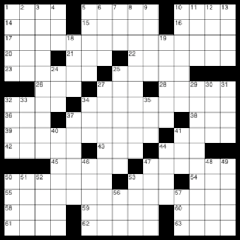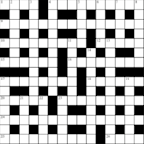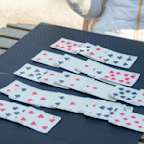Search results
- Compared to their baseline performance on a 70-point scale, crossword puzzles improved participants' cognition by about one point at the 12-week timepoint, and by about half a point at the 78-week timepoint.
www.health.harvard.edu › blog › have-you-done-your-crossword-puzzle-today-202211292857
People also ask
Do crossword puzzles make your brain sharper?
How do you solve a crossword puzzle?
Are crossword puzzles making you smarter?
Are crossword puzzles difficult?
Jan 22, 2024 · A study indicated that crossword fans had better cognitive function in old age, but experts say it’s still a cryptic question. Madeleine Aggeler. Mon 22 Jan 2024 12.05 EST. Last modified on Tue ...
- Madeleine Aggeler
- Will Doing Crossword Puzzles Help Everyone?
- How Much Did Crossword Puzzles Benefit Thinking and Memory?
- How Much Might Crossword Puzzles Benefit Your Brain?
- How Many Crossword Puzzles Should You Be Doing?
- Why Are Crossword Puzzles Beneficial?
The participants in this 18-month study were between 62 and 80 years of age. All had mild cognitive impairment, which means that their thinking and memory were impaired compared to healthy older adults. Twenty-five percent identified as Black or Latino, and thus — at least regarding race and ethnicity — the results are likely generalizable to the p...
Study participants were randomly assigned to either a group that solved online crossword puzzles or a group that played online cognitive games focused on memory, processing speed, and executive function. Each group completed 30-minute sessions four times weekly for 12 weeks. They also engaged in several shorter booster sessions. Compared to their b...
In individuals with mild cognitive impairment and in those aging normally, the brain tends to shrink. So, the question to ask about brain volume is whether an intervention like medication or crossword puzzles can slow the shrinkage. Two common structures evaluated in this context are the size of the hippocampus, which remembers the episodes of your...
A look at the study protocol reveals that the participants were asked to work on crossword puzzles four times a week, for 30 minutes per session. The crossword puzzles were designed to be moderately difficult, equivalent to a Thursday New York Times crossword puzzle.
There are several reasons why working on crossword puzzles in daily life could improve your thinking and memory, and even slow the shrinking of your brain. 1. First, doing crossword puzzles is difficult, and many studieshave shown that performing moderately difficult cognitive tasks is helpful for cognitive and brain health. 2. Second, a well-desig...
- hhp_info@health.harvard.edu
Mar 17, 2020 · “Regular crosswords and number puzzles linked to sharper brain in later life,” a May 2019 Science Daily headline proclaims. According to a University of Exeter study, older adults who...
- Adrienne Raphel
May 16, 2019 · Researchers found that those who frequently completed crossword and Sudoku puzzles had sharper performance "across a range of tasks assessing memory, attention, and reasoning." Puzzles don't just make for a fun rainy day activity.
- Michelle Darrisaw
- 7 min
- Culture & News Writer
“This new research does reveal a link between word puzzles, like crosswords, and memory and thinking skills,” adds Dr. Doug Brown, Director of Research of Alzheimer’s Society, “but we can’t say...
Apr 3, 2024 · 1. Start with the easy ones. Begin your crossword-solving journey by filling in the easy answers first. Look for clues with straightforward answers that immediately come to mind. This will help you gain momentum and confidence as you tackle more challenging clues later. 2. Scan for theme clues.
Jul 2, 2023 · Crossword puzzles are a popular pastime for many people. They are a great way to keep your mind sharp and improve your vocabulary. However, they can also be quite challenging, especially for beginners. That’s why we’ve put together this article with tips and tricks to help you solve crossword puzzles with ease.









